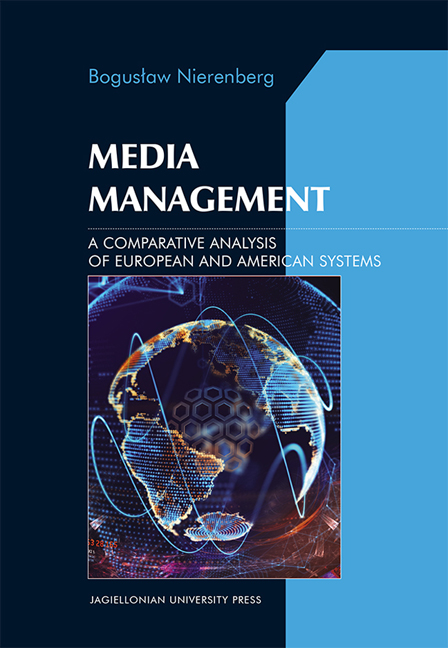Book contents
- Frontmatter
- Dedication
- Contents
- Introduction
- Epigraph
- Part 1
- Part 2
- Part 3
- Chapter 7 Managers and Journalists
- Chapter 8 Strategies of Media Organizations. Value for Consumers
- Chapter 9 Legal and Ethical Aspects of Media Management
- Chapter 10 Developmental Trends of Media Organizations. Indicators of the Future of the Media
- Summary
- Bibliography
- Lists of Tables, Figures and Charts
Chapter 8 - Strategies of Media Organizations. Value for Consumers
from Part 3
Published online by Cambridge University Press: 10 January 2018
- Frontmatter
- Dedication
- Contents
- Introduction
- Epigraph
- Part 1
- Part 2
- Part 3
- Chapter 7 Managers and Journalists
- Chapter 8 Strategies of Media Organizations. Value for Consumers
- Chapter 9 Legal and Ethical Aspects of Media Management
- Chapter 10 Developmental Trends of Media Organizations. Indicators of the Future of the Media
- Summary
- Bibliography
- Lists of Tables, Figures and Charts
Summary
Strategy vs. Marketing Communication
Peter Doyle [2003: 6] indicates that the history of economic changes until now might be examined through the lens of three subsequent epochs. The first of them, being the agricultural period, began 10 thousand years ago and ended in the first half of the 18th century. After that, the industrial period lasted until the 1960s when the information age began. Two antecedent epochs had exhausted their developmental capabilities. The agricultural period in its decadent stage lowered the standard of life. A new developmental impulse accompanied industrialization which started using up its developmental capabilities in the second half of the 20th century. At this point entering the informational epoch served as a countermeasure to the lowering of the standard of living. Determinants that ought to be considered in this new informational epoch while building the strategy of operation are as follows:
Globalization of markets
Change in the structure of industry
Informational revolution
Growing expectations of customers
One distinguishes many definitions referring to strategy. For the purpose of these considerations the following one seems to be of great use: “Strategy can be defined as the determination of the basic long-term goals and objectives of an enterprise, and the adoption of courses of action and the allocation of resources necessary for carrying out there goals [Chandler 1978: 13].” In other words, a strategy is a plan to make use of enterprise resources in order to obtain a competitive advantage [Doyle 2003: 12]. The cited definitions also seems to be useful in analyzing the strategy of media organizations.
The media in the contemporary world are subject to numerous processes that determine the strategy of their operations. These include above all processes of convergence, digitization. In the case of the electronic media the process of moving from an analog to a digital signal is not merely a simple change in technology. It is an immense transformation, the final results of which are hard to judge as of now. It is primarily an ability to use properties of information as the new resource (as previously mentioned repeatedly).
- Type
- Chapter
- Information
- Media ManagementA Comparative Analysis of European and American Systems, pp. 147 - 166Publisher: Jagiellonian University PressPrint publication year: 2016



